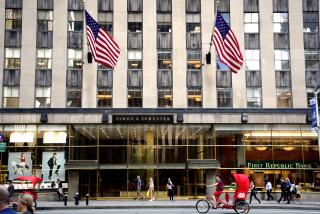Publisher, Parent Just Weren’t on Same Page
- Share via
Former Vivendi Universal Chief Executive Jean-Marie Messier anointed Curious George as the company mascot last year, linking the French utility company he was struggling to remake into a media giant and George’s owner, Houghton Mifflin, the publishing company Vivendi had just acquired.
Trouble is, that was the extent of any “synergy” between Houghton Mifflin and Vivendi.
Now that the French firm is under pressure to raise $9.8 billion to pay off its mounting debt, George and his Boston-based publisher have “For Sale” signs hanging around their necks.
Faced with a fast deteriorating financial situation, Messier’s successor, Jean-Rene Fourtou on Wednesday reversed his 2-week-old pledge to keep Houghton Mifflin within Vivendi, revealing perhaps a lack of direction if not conviction.
Beyond that, it’s unclear whether the sale is part of a broader strategy--or just desperation. Equally uncertain is the future of Vivendi’s European publishing unit or whether there are buyers for Houghton Mifflin, considered a publishing gem.
This much, however, is increasingly clear: Book publishing is a distinct business that operates independently from other media businesses.
Despite the tendency to lump books in with all things media, analysts and industry executives say there is little evidence that pairing publishing with movie studios, television networks and music companies adds up to more than just a simple sum of the parts.
“Consumer publishing has virtually nothing to do with the other aspects of the media industry,” said Veronis Suhler Stevenson analyst Bob Broadwater. Added an industry executive: “It’s a nice adjacent business. But it’s not vertically integrated into the rest of the parts.”
Standard & Poor’s analyst Harold Diamond said, “The strategy that appeared very good on paper three or four years ago is not playing out.”
It’s not a knock on books.
There can be significant fluctuations in year-to-year sales, but the book industry traditionally experiences steady but slow long-term growth, said Broadwater.
Consumer publishing is a $17.9-billion industry, growing an average of 2% to 3% a year. Textbooks, which operate as a separate business, is a $7.6-billion industry that has enjoyed higher growth rates recently, as much as 8% annually. But it is expected to slow down as the economy takes a bite out of state and local education spending.
Houghton Mifflin, strong in both categories with $1 billion in annual revenue, reflects those overall industry trends, analysts say.
“It dominates K-12 and has a very attractive testing division,” said Martin Maleska, an expert on educational publishing with Veronis. “From all reports, Houghton Mifflin is doing well.”
Its consumer books division is far smaller, but a strong performer as well, according to Veronis.
“What you want is a small, high-quality backlist of books everyone has to read,” Broadwater said. “And that’s what Houghton has.”
Sales of its “Lord of the Rings” series, goosed by the recently released movie, he said, “gave them a big pop.”
Still, buyers willing to pay the $1.7 billion it cost Vivendi to buy Houghton Mifflin may be scarce. It’s a terrible climate to try to sell anything, analysts said.
“It’s going to be tough,” said Credit Suisse First Boston analyst Brandon Dobell. “Besides, the biggest textbook publishers [McGraw-Hill, Reed Elsevier, and Pearson] will face antitrust issues.”
Viacom Inc.-owned Simon & Schuster as well as News Corp.’s HarperCollins unit are considered potential buyers, if the price is right.
Bertelsmann, which owns Random House and dominates the U.S. consumer publishing industry, also is considered a potential buyer for at least some of Houghton Mifflin’s assets.
“We’re in the book business to stay. It has its ups and downs but we’re very optimistic about the long-term prospects,” said Random House spokesman Stuart Applebaum.
(BEGIN TEXT OF INFOBOX)
At a Glance
Houghton Mifflin, based in Boston, was an independent book publisher for 169 years before being purchased by Vivendi Universal in June 2001 for $1.7 billion.
*Founded: 1832 in Boston *Revenue: $1.03 billion in 2000. Vivendi does not break revenue out separately, but the company says it has continued to have revenue of about $1 billion a year. *Rank: Fourth-largest textbook publisher in the U.S. *Scope: Considered a small consumer publisher with a few well-known titles, including the American Heritage Dictionary, the Curious George series of children’s books, J.R.R. Tolkien’s “The Lord of the Rings” trilogy and Jonathan Safran Foer’s novel “Everything Is Illuminated.” Also includes Riverside Publishing (an educational testing company), Great Source (supplemental educational materials) and CAT-ASI (workplace certification).
Source: Times research
More to Read
Sign up for our Book Club newsletter
Get the latest news, events and more from the Los Angeles Times Book Club, and help us get L.A. reading and talking.
You may occasionally receive promotional content from the Los Angeles Times.











